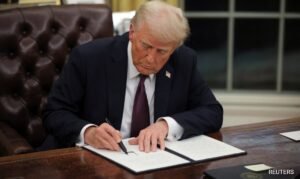In a landmark legal showdown, attorneys general from 22 States Sue. Have filed a lawsuit against former US President Donald Trump’s executive order to end birthright citizenship. The order, which aims to deny automatic citizenship to certain US-born individuals, has reignited debates over immigration and constitutional rights.
What Is Birthright Citizenship?
Birthright citizenship is the legal principle under which every person born on US soil receives automatic US citizenship regardless of their parent’s immigration status. Based on the 14th Amendment to the US Constitution, children born to immigrants, who are on a tourist visa, or undocumented or other non-citizens, should be recognized as US citizens.
Historical Background: 22 States Sue
The 14th Amendment, ratified in 1868, was a product of the Reconstruction era following the Civil War. It was designed to guarantee citizenship rights to former slaves and their descendants, marking a critical step toward equality in the United States.
The language of the Amendment, particularly the clause “all persons born or naturalized in the United States and subject to the jurisdiction thereof,” has been a staple of US citizenship law. But it is now at the heart of this political and legal fight.
22 States Sue Trump’s Executive Order: What It Means
The executive order, which was issued in January, questions the long-standing understanding of the 14th Amendment. Specifically, it bars citizenship to those whose mothers were here illegally or whose fathers were not citizens or lawful permanent residents of the US.
Major Provisions of the Order
Exclusion of Non-Citizen Parents: Those born to mothers who are present illegally or temporarily in the US are barred from citizenship.
Parental Residency Conditions: Citizenship is denied to children born where their fathers are United States citizens or lawful permanent residents.
Agency Non-Recognition: All agencies of the United States government are prohibited from accepting evidence of citizenship for persons who fall within any of these classes.
The order becomes effective 30 days after issuance, thereby placing citizenship status at risk for thousands of children born in the United States.
22 States Sue: Legal and Political Responses
In total, 22 states, backed by Democratic attorneys general, presented a case to an appellate court by filing a case in federal court against the attempt to enforce the executive order announced by Trump, to thwart its implementation on the grounds of violating established constitutional protections and violations of equal rights and justice principles. Matt Platkin, New Jersey’s attorney general, said Trump’s order “cannot, by a stroke of a pen erase the 14th Amendment”.
Connecticut Attorney General William Tong, a US citizen by birthright. The first Chinese American to hold the position called the lawsuit personal. Highlighting how this issue affects countless immigrant families.
The White House’s Response
The White House has defended the order, dismissing the lawsuits as an extension of political resistance from the Left. It maintains that stricter citizenship policies are necessary to address immigration issues and protect the nation’s interests.
22 States Sue The Constitutional Debate: Interpreting the 14th Amendment
The central legal question revolves around the interpretation of the 14th Amendment. Supporters of birthright citizenship argue that the Amendment’s text unequivocally guarantees citizenship to all individuals born in the US. Critics, including Trump and his allies, argue that this interpretation is outdated and that stricter parental requirements should be enforced.
The result of this battle will have widespread implications for defining citizenship in the United States and the scope of presidential authority in shaping constitutional policy.
More General Implications on Immigration Policy
Effect on the Immigrant Communities
The executive order has instilled fear and insecurity among immigrant families. Children who are born to non-citizens who reside in the US may encounter difficulties in showing proof of their citizenship, which makes them stateless or deportable.
Long-Term Legal Precedents
If the order is upheld, it will set a precedent that future administrations can use to reinterpret constitutional amendments through executive action. This would raise concerns about the balance of power between the executive branch and the judiciary.
What’s Next?
This will, of course, set off a long and possibly even judicially resolved battle all the way up to the Supreme Court. It will challenge the mettle of the 14th Amendment and its legal protections in this case.
The Biden administration has opposed the order, meaning that it might reassess the policy and reverse it if it wins in court. Meanwhile, advocacy groups are mobilizing public opinion in support of birthright citizenship. Arguing that the nation’s values of equality and inclusion cannot be compromise.

FAQs on 22 States Sue
1. What is the 14th Amendment?
The 14th Amendment provides citizenship to all persons born or naturalized in the US and gives equal protection under the law. It was ratified during the Reconstruction period in 1868.
2. What does Trump’s executive order change?
The Trump order rescinds automatic citizenship to children born in the US. Whose mothers were here illegally or on a temporary visa and whose fathers are not US citizens or lawful residents.
3. How will this impact immigrant families?
The order would make children born to non-citizen parents ineligible for citizenship, creating legal and social problems for these families.
4. What are the arguments against the order?
Critics say the order violates the 14th Amendment, which grants birthright citizenship and exceeds presidential power in amending constitutional provisions.
5. What is the probability of the order being enforced?
The order poses a significant legal challenge for the administration as it faces lawsuits from 22 states that seek to restrain its implementation. Therefore, the final decision is made by the Supreme Court.
Conclusion
The debate on birthright citizenship intertwines the thorny issues of immigration, constitutional law, and also executive authority. This judgment or ruling will not only take shape regarding future citizenship policies. But will also give life to the principles of justice and equality as contemplated in the US Constitution.







Be First to Comment